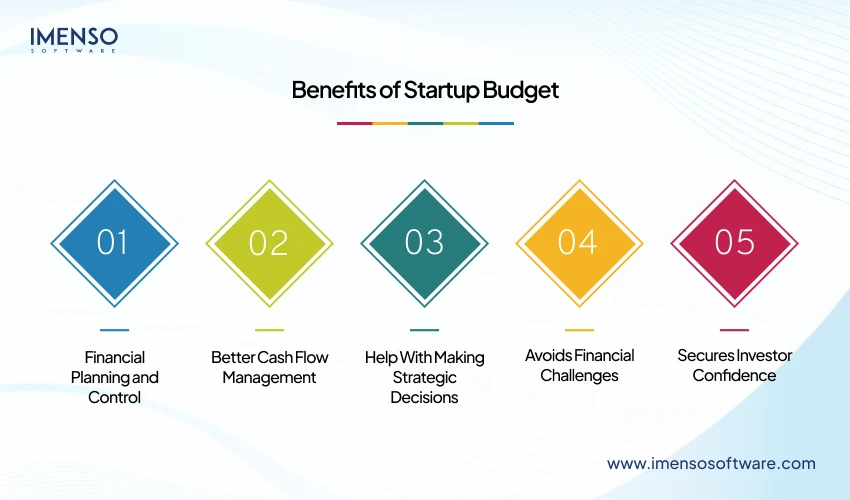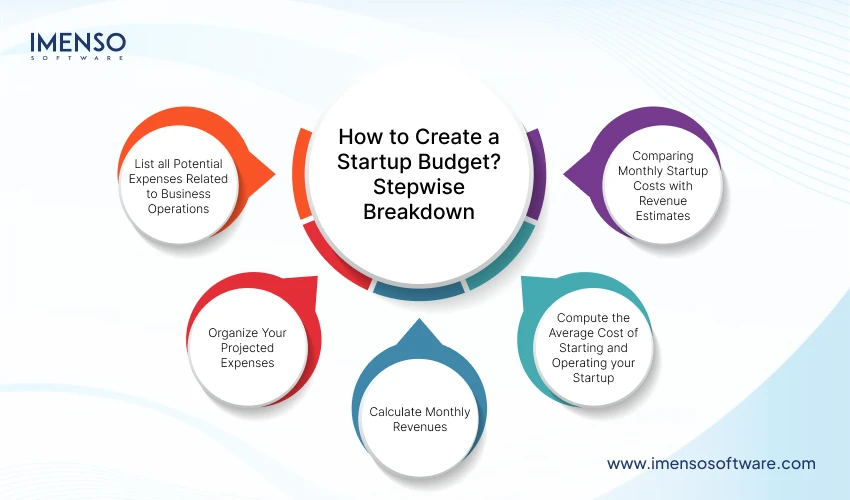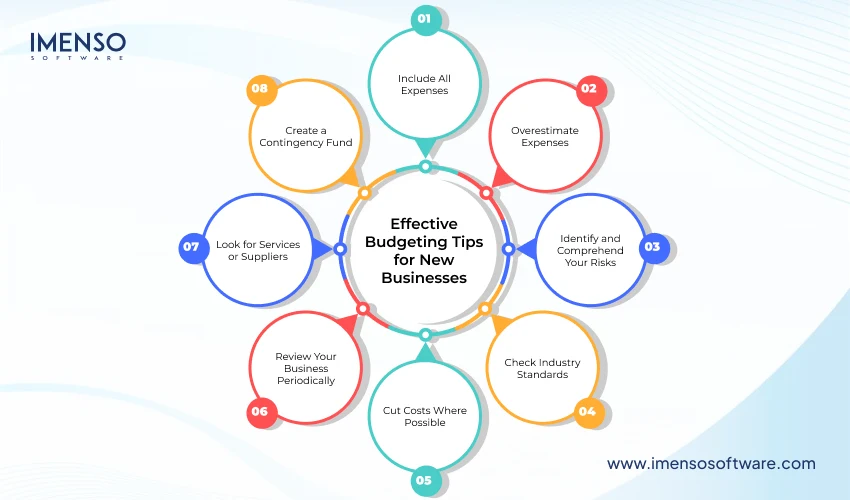Creating a Realistic Budget for Your Startup: Best Practices

In 2010, Bobby Ghoshal, and Matthew Ausonio launched Flud, a social news reader. Available for Androids, Windows, iPhones, and iPads, Flud had many unique features. Firstly, users could save or store news and articles in the reading list to read later. It displayed RSS feeds from other news sites, letting the reader stream multiple sources of news simultaneously on a single platform. With a stunning UI design, Flud was considered one of the best social news readers.
Looking at its widespread adoption, anyone at the time could tell that this is going to be a major player in the domain of social news consumption. The reality however turned out to be entirely different. Flud shut down just three years after in 2013! The reason? The startup was unable to raise more funds for its operations. The company couldn’t become profitable and ultimately ran out of cash.
Creating a Realistic Budget to Avoid the Fate of Flud
While the concept behind Flud was unique, its story isn’t. Research shows that running out of cash is behind 44% of startup failures.
Flud’s inability to raise funding can be closely linked to their budget creation and management practices. An unrealistic or poor startup budgeting indicates to investors that you lack a good understanding of the financial needs of your company. It makes them hesitant to invest.
Contrarily, a realistic and effective budget demonstrates financial discipline. It increases your chances of securing funding and not experiencing the outcome that Flud faced.
Keep reading to learn everything about creating realistic budgets that actually work for startups.
What is a Startup Budgeting?
A startup budget is a core component of financial planning for startups. It outlines the estimated expenses and revenues for small/new businesses. The budget acts as a blueprint to allocate resources, manage cash flow, and make sound financial decisions. Creating realistic budgets enables a business to weather the challenges on the road to revenue generation and avoid financial pitfalls.
Startup budgeting involves estimating costs, expenses, and earning sources. It includes everything, from employee salaries to marketing expenses, office rent, and more. When all of these things are taken into account, you get a clear picture of all financial elements. Thus, it enables you to make informed plans for the future. An effective budget also allows you to attract potential investors.
Benefits of Startup Budget

A startup budget guides your business journey, helping you avoid costly mistakes. Here are all the benefits of budgeting.
Financial Planning and Control
A budget allows startups to allocate resources efficiently. When you know where your money is going, you avoid overspending. You also ensure that funds are available for essential things like marketing product development, etc. This, in turn, ensures that your operations run seamlessly supporting your business growth.
Better Cash Flow Management
A comprehensive budget helps with accurate tracking of the money coming in and going out. This prevents cash shortages and allows for better planning of expenses and running daily operations.
Help With Making Strategic Decisions
A well-structured budget lets you compare your real performance against your budget. Thus, you can find out if you are sticking with your financial plan. This knowledge allows you to revise your budget and make better decisions.
Avoids Financial Challenges
Startups often incur unexpected expenses. A startup budget enables you to identify potential financial risks. When you have all your revenue streams and expenditures out in front of you, you can pinpoint areas where financial challenges can arise. Thus, you can mitigate risks before they become damaging to your business.
Secures Investor Confidence
A realistic and well-prepared budget showcases to your potential investors that you have a good grasp of your financial needs. This understanding fosters trust and makes them willing to fund your startup. A well-formed budget shows that you have a practical plan for accomplishing your financial goals. This assurance makes investors confident in your ability to grow and become profitable.
How to Create a Startup Budget? Stepwise Breakdown

Without a practical and effective budget, it’s highly unlikely for startups to continue for more than five years. A well-structured budget is key to ensuring its financial viability. Here’s a stepwise breakdown of the budget creation process that any startup or small business can use.
List all Potential Expenses Related to Business Operations
The first step is to brainstorm and list everything that you need to begin and grow your startup in the initial year. Some effective tips to make this process more effective are as follows:
- Be extremely specific: You must know exactly what you need. List every little and big thing you will need for financial planning. For example, instead of adding a laptop, add an HP laptop, keyboard, etc.
- Include estimated costs for each item: Every potential business expense should include an estimated cost for a 1-year period. Do not include any item whose cost you don’t know. If there is something whose cost you aren’t sure about even after research, it’s better to skip it. But if it is important to you, include it with a generous estimate.
- Protect your budget to shield it against cash shortages: One of the budgeting best practices is to pad your expenses by 10%. It enables you to secure your startup against unexpected cash circumstances or cash shortages. Some areas where founders underestimate expenses include fees related to business insurance, licensing, and marketing and advertising expenditures.
Organize Your Projected Expenses
Once you have all your expected costs in place, categorize them into the following:
Necessary Startup Costs
These are one-time expenses that are essential to kickstart your business activities. Although they can vary based on the type of startup, the following are some common costs.
- Business registration fees
- Computers and other equipment
- Inventory
- Patents
Fixed Costs
Fixed costs are the recurring expenditure related to running your business. As long as your startup is running, you’ll need to bear these costs. Some basic fixed costs to budget for include:
- Rent or mortgage
- Website hosting
- Salaries and employee benefits
- Licenses, permits, and certifications
- Business insurance
- Utilities, such as internet and phone
- Accounting
- Business communications
Variable Costs
These are expenses that fluctuate relative to your business output or priorities at a specific time. Here are some common variable costs:
- Paid advertising
- Server hosting fees
- Marketing agencies
- Legal fees
- Contractors/freelancers
- Sales software
- Trade shows and events
- Transportation
- Business income taxes
Calculate Monthly Revenues
Your monthly revenues can come from multiple sources. Some common income sources for startups include:
- Sales: If you haven’t had any sales yet, look at the expenses you listed in the earlier step. Determine how much sales you’ll need to cover that expense as a whole. If you’ve had sales before, refer to the historical sales revenues to estimate how much your sales can generate in the upcoming 12 months.
- Investments and loans: This includes capital from funding sources, such as personal assets from yourself and co-founders, angel investors, VC firms, or bank loans.
- Savings accounts: Revenue can also be the interest rate you have earned from your money market or savings account balance. If you have opened a high-yield startup bank account, chances are you will earn a generous interest.
Compute the Average Cost of Starting and Operating your Startup
Now you have listed all the items that will determine the cost of opening and running your startup. The next step is to add all of them to figure out the starting point of your budget. Here’s what you need to do.
- Calculate your annual and monthly budget: Calculate the sum of all costs outlined in the first step to find your annual budget. Now, divide that number by 12 to get your monthly startup budget.
- Adjust costs: Look at variable costs. You’ll find that you may ‘like’ to have certain things but not necessarily ‘need’ them, especially in the initial phase of your business. Revise these items according to your priority. Then, look at fixed and essential costs. If any of the items are draining your budget, consider their alternatives.
Comparing Monthly Startup Costs with Revenue Estimates
Take the average monthly startup costs you calculated in the previous step and compare them with your monthly revenue estimates. If the revenue isn’t enough to cover business expenses, adjust your total costs. Alternatively, secure sources of additional capital to fund your business.
Also Read:
How to Choose a Top Software Development Company for Startups
Product Roadmap for Startups: Aligning With Your Business Strategy
Conducting Market Research: A Comprehensive Guide for Startups
Effective Budgeting Tips for New Businesses

Budgeting is indispensable for small businesses because they can quickly go into debt. It can save you from facing cash flow difficulties. Here are some budgeting best practices for startups and small businesses.
Include All Expenses
We’ve covered this above as part of the budget creation process. Still, it’s important to reiterate it here because of how important it is. Ensure to include every single monthly business expense to create an effective budget. As such, you must include fixed costs, variable expenses, and one-time expenses in your budget.
Overestimate Expenses
Overestimating expenses is an important part of successful financial planning for startups. As a new business, you don’t have the safety net that large enterprises have to safeguard themselves from unexpected expenses.
Startups already operate with limited capital. Any underestimates in the budget can throw you off guard. Contrarily, overestimating expenses will help you avoid money shortages and boost cash flow if the actual expense happens to be lower than expected.
Identify and Comprehend Your Risks
Every line in your budget is associated with an equal risk amount. It can either go above or fall short of the estimated line. So, conduct a risk assessment and think about why a specific amount is being quoted.
Prioritize expenses based on the impact of your budget. Find out more about every line in your budget to get a more accurate forecast. Do a comprehensive risk management on your budgeting to recognize and prevent risks.
Check Industry Standards
Businesses in a specific industry tend to share certain similarities. So, research about your industry from different sources. Use online sources such as the internet for data related to your industry. Meet with local business owners or check the Internal Revenue Service (IRS) website. It will give you a decent idea of the portion of revenue that will likely be directed toward different types of expenses.
As a new business, you are more vulnerable to industry downturns than bigger companies in your industry. So, it is good to have an idea of the expected average revenue.
Cut Costs Where Possible
An important component of creating realistic budgets for startups is cost-cutting wherever possible. Entrepreneurs face plenty of situations where the availability of money is crucial to advance business. For example, capitalizing on an opportunity, paying an urgent bill, or advertising.
To pay for these high-priority tasks, consider cost-cutting. Look at items that can be controlled. Alternatively, start your purchases only after the beginning of a new billing cycle. You can also consider taking advantage of payment terms offered by any creditors or your suppliers.
Review Your Business Periodically
Startups should budget more often. The modern marketplace is highly volatile. Expenses can arise unpredictably, throwing small businesses off track. It also negatively affects revenue assumptions. One of the budgeting best practices for startups would be to create a budget planning calendar. It ensures that business owners have adequate capital to fulfill all business needs.
Look for Services or Suppliers
Search for new suppliers who may offer services at a lesser price. Look for ways to save money on other services being performed for your startup. Do this while starting up a business, setting yearly or monthly budgets, and during regular business reviews.
Create a Contingency Fund
A contingency fund protects your business against financial uncertainties. Allocate around 5 to 10% of your overall budget to this fund. Periodically contributing to this fund will help your business be prepared for unpredictable circumstances and economic downturns. At the same time, you won’t have to compromise any other part of your budget to meet unexpected expenses.
Achieving Success With Effective Budgeting
If there’s one thing that every successful business has in common, it’s effective budget management. However, those who struggle in this area rely on tools like spreadsheets to manage budgets. This isn’t the most reliable option as it has a high risk of human error. As a startup scales and the frequency of transactions increases, managing a budget through spreadsheets becomes exponentially more damaging to the business.
At this time, investing in business budgeting software can make a world of difference. At Imenso Software, we believe in creating solutions that help startups navigate financial challenges effortlessly. Our products streamline budgeting, forecasting, and reporting processes for startups, small businesses as well as medium and large-scale companies.
Our budgeting solutions help business owners manage cash flow, collaborate better, and keep themselves financially secure. Interested to know how we’ve helped startups like yours? Read our reviews on Clutch. If you want more information on how we can help you, get in touch with us today.
We’re honored to mention that our efforts have been recognized by renowned B2B review and research platforms such as GoodFirms, Clutch, MirrorView, and many more.
Want more information about our services?
Similar Posts

How to Identify and Eliminate Bottlenecks in Your Business Processes
eAccording to McKinsey research high-performing IT functions lead organizations to achieve 35% higher revenue growth and 10% higher profit margins. Startup activities suffer from productivity losses when approval delays. These delays happen due to delayed technology implementation along with high employee workloads. Those who implement business process optimization for startups will remove these performance-degrading problems […]...

The Critical Role of .Net Support in Modern Application Development for Startups
Imagine a top e-commerce retailer seeing huge traffic spikes during holiday sales. The app faces a sudden surge in orders. This causes a system crash within a few minutes. This is due to weak performance and unsecured software vulnerabilities. As a result, the company loses customer satisfaction and sales revenue. This has a negative effect […]...

How to Perform a Competitive Analysis: A Guide for Startups
Have you ever wondered how Netflix went from DVD rentals to streaming big? It all started with mastering competitive analysis. Netflix and Blockbuster were rivals in the DVD rental and video store market. However, only one of them changed with the times. Netflix took the chance to revolutionize the market with streaming. Blockbuster held the […]...









